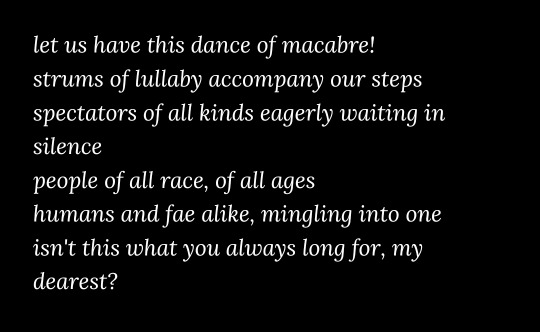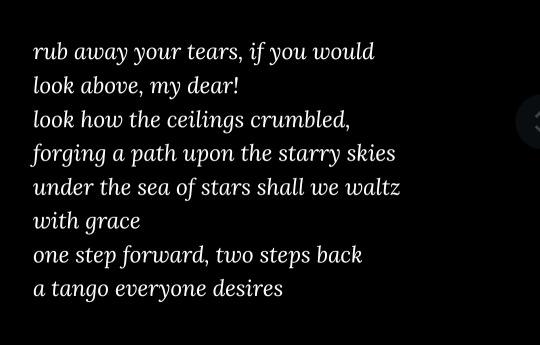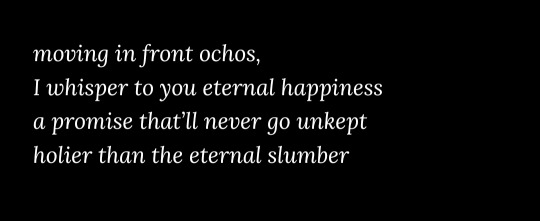#save the decay
Text

You're one microscopic cog in his catastrophic plan;
designed and directed by his Red Right Hand.
#Andor#Star wars#Cassian Andor#Luthen Rael#Cinta Kaz#Vel Sartha#Kleya Marki#Mon Mothma#Bix Caleen#Lonni Jung#Oats.png#myart#Shoutout to the Decaying City Skyline brush by Jazza... she saves my life daily
210 notes
·
View notes
Text



devotion.
#I love making art of my favorite characters with religious imagery#I have no clue how I did this#blacked out and all of a sudden the hair was rendered#bsd#bungou stray dogs#bsd fanart#my art#bsd sigma#decay of angels#sigma#sigma bungou stray dogs#religous themes#religous imagery#inspired by a bunch of old nun photos I have saved to my Pinterest lmao
100 notes
·
View notes
Text
I thought too hard about Among Us and now I have serious concerns regarding that reactor
#among us#radiationposting#ice speaks#WHY DOES YOUR SCRAM NEED TWO PEOPLE#DID THE IMPOSTERS BUILD THAT#every design idea i came up with had at least one fatal flaw and the solution also had their own fatal flaws#that's probably on me but still#i came to the hilarious conclusion of 'you better save all that xenon for later because you WILL need it'#'but it will decay' bold of you to assume that the reactor can go that long without threatening to blow up#i might study nuclear engineering actually because no sane person thinks about this for so long
114 notes
·
View notes
Text



The three genders
#Save sigma#poor guy#artists on tumblr#drawing#my art#sketch#ballpointsketch#ballpointpen#ball point drawing#bungou stray dogs#bungou gay dogs#bsd#doa trio#bsd decay of angels#bsd fyodor#bsd nikolai#bsd sigma
86 notes
·
View notes
Text
ed: "let's go slow"
fandom, probably right: the boys are being healthy and communicating well
me, lover of drama: nah Ed's just fucked up by what Mary said that once the mystery and spark is gone all that's left is resentment and fury so he's trying to draw it out bc some part of him still believes stede will leave again and prove once and for all that he is eternally unloveable
#our flag means death#our flag means death spoilers#ofmd#ofmd spoilers#do i actually think this is where the show is going? no#do i sort of wish it was? yeah kinda#moreso something i hope fic explores#ed desperately trying not to fuck stede#in the hopes it will further delay their inevitable decay as a couple#i do not believe edward teach could accurately assess a healthy boundary to save his life#gentlebeard
149 notes
·
View notes
Text

I am the only one who has ever understood Andy at all (I'm being delusional again)
#andrew graves#pocketcat#rher#burial route#decay route#tcoaal#fear & hunger#the coffin of andy and leyley#fear and hunger#crossover#transgender#transitioning could've saved her#do you understand what I'm saying here???
64 notes
·
View notes
Text
Podcasting "Let the Platforms Burn"

This week on my podcast, I read “Let the Platforms Burn,” a recent Medium column making the case that we should focus more on making it easier for people to leave platforms, rather than making the platforms less terrible places to be:
https://doctorow.medium.com/let-the-platforms-burn-6fb3e6c0d980
The platforms used to be source of online stability, and many argued that by consolidating the wide and wooly web into a few “curated” silos, the platforms were replacing chaos with good stewardship. If we wanted to make the internet hospitable to normies, we were told, we had to accept that Apple and Facebook’s tightly managed “simplicity” were the only way to get there.
But today, all the platforms are on fire, all the time. They are rocked by scandals every bit as awful as the failures of the smaller sites of yesteryear, but while harms of a Geocities or Livejournal moderation failure were confined to a small group of specialized users, failures in the big silos reach hundreds of millions or even billions of people.
What should we do about the rolling crisis of the platforms? The default response — beloved of Big Tech’s boosters and critics alike — is to impose rules on the platforms to make them more hospitable places for the billions they’ve engulfed. But I think that will fail. Instead, I think we should make the platforms less important places by freeing those billions.
That’s the argument of the column.
Think of California’s wildfires. While climate change has increased the intensity and frequency of our fires, climate (and neglect by PG&E) is merely part of the story. The other part of the story is fire-debt.
For millennia, the original people of California practiced controlled burns of the forests they lived, hunted, and played in. These burns cleared out sick and dying trees, scoured the forest floor of tinder, and opened spaces in the canopy that gave rise to new growth. Forests need fire — literally: the California redwood can’t reproduce without it:
https://www.pbs.org/wnet/nature/giant-sequoia-needs-fire-grow/15094/
But this ended centuries ago, when settlers stole the land and declared an end to “cultural burning” by the indigenous people they expropriated, imprisoned, and killed. They established permanent settlements within the fire zone, and embarked on a journey of escalating measures to keep that smouldering fire zone from igniting.
These heroic measures continue today, and they’ve set up a vicious cycle: fire suppression creates the illusion that it’s safe to live at the wildlife urban interface. Taken in by this illusion, more people move to the fire zone — and their presence creates political pressure for even more heroic measures.
The thing is, fire suppression doesn’t mean no fires — it means wildfires. The fire debt mounts and mounts, and without an orderly bankruptcy — controlled burns — we get chaotic defaults, the kind of fire that wipes out whole towns.
Eventually, we will have to change tacks: rather than making it safe to stay in the fire zone, we’re going to have to make it easy to leave, so that we can return to those controlled burns and pay down those fire-debts.
And that’s what we need to do with the platforms.
For most of the history of consumer tech and digital networks, fire was the norm. New platforms — PC companies, operating systems, online services — would spring up and grow with incredible speed, only to collapse, seemingly without warning.
To get to the bottom of this phenomenon, you need to understand two concepts: network effects and switching costs.
Network effects: A service enjoys network effects if it increases in value as more people use it. AOL Instant Messenger grows in usefulness every time someone signs up for it, and so does Facebook. The more users, the more reasons to join. The more people who join, the more people will join.
Switching costs: The things you have to give up when you leave a product or service. When you quit Audible, you have to throw away all your audiobooks (they will only play on Audible-approved players). When you leave Facebook, you have to say goodbye to all the friends, family, communities and customers that brought you there.
Tech has historically enjoyed enormous network effects, which propelled explosive growth. But it also enjoyed low switching costs, which underpinned implosive contraction. Because digital systems are universal (all computers can run all programs; all nodes on the network can connect to one another), it was historically very easy to switch from one service to another.
Someone building a new messenger service or social media platform could import your list of contacts, or even use bots to fetch the messages left for you on the old service and put them in the inbox on the new one, and then push your replies back to the people you left behind. Likewise, when Apple made its iWork office suite, it could reverse-engineer the Microsoft Office file formats so you could take all your data with you if you quit Windows and switched to MacOS:
https://www.eff.org/deeplinks/2019/06/adversarial-interoperability-reviving-elegant-weapon-more-civilized-age-slay
This dynamic — network effects growth and low switching costs contraction — is why we think of tech as so dynamic. It’s companies like DEC were able to turn out minicomputers that shattered the dominance of mainframes. But it’s also why DEC was brought so low that a PC company, Compaq — was able to buy it for pennies on the dollar. Compaq — a company that built an empire by making interoperable IBM PC clones — was itself “disrupted” a few years later, and HP bought it for spare change found in the sofa cushions.
But HP didn’t fall to Compaq’s fate. It survived — as did IBM, Microsoft, Apple, Google and Facebook. Somehow, the cycle of “good fire” that kept any company from growing too powerful was interrupted.
Today’s tech giants run “walled gardens” that are actually walled prisons that entrap their billions of users by imposing high switching costs on them. How did that happen? How did tech become “five giant websites filled with screenshots from the other four?”
https://twitter.com/tveastman/status/1069674780826071040
The answer lies in the fact that tech was born as antitrust was dying. Reagan hit the campaign trail the same year the Apple ][+ hit shelves. With every presidency since, tech has grown more powerful and antitrust has grown weaker (the Biden administration has halted this decay, but it must repair 40 years’ worth of sabotage).
This allowed tech to “merge to monopoly.” Google built a single successful product — a search engine — and then conquered the web by buying other peoples’ companies, even as their own internal product development process produced a nearly unbroken string of flops. Apple buys 90 companies a year — Tim Cook brings home a new company more often than you bring home a bag of groceries:
https://www.theverge.com/2019/5/6/18531570/apple-company-purchases-startups-tim-cook-buy-rate
When Facebook was threatened by an upstart called Instagram, Mark Zuckerberg sent a middle-of-the-night email to his CFO defending his plan to pay $1b for the then-tiny company, insisting that the only way to secure eternal dominance was to eliminate competitors — by buying them out, not by being better than them. As Zuckerberg says, “It is better to buy than compete”:
https://www.theverge.com/2020/7/29/21345723/facebook-instagram-documents-emails-mark-zuckerberg-kevin-systrom-hearing
As tech consolidated into a cozy oligopoly whose execs hopped from one company to another, they rigged the game. They colluded on a criminal “no-poach” deal to suppress their workers’ wages:
https://en.wikipedia.org/wiki/High-Tech_Employee_Antitrust_Litigation
And they colluded to illegally rig the ad-market:
https://en.wikipedia.org/wiki/Jedi_Blue
This collusion is the inevitable result of market concentration. 100 squabbling tech companies will be at each others’ throats, unable to agree on catering for their annual meeting much less a common lobbying agenda. But boil those companies down to a bare handful and they’ll quickly converge on a single hymn and twine their voices in eerie harmony:
https://pluralistic.net/2023/03/16/compulsive-cheaters/#rigged
Eliminating antitrust enforcement — letting companies buy and merge with competitors, permitting predatory pricing and other exclusionary tactics — was the first step towards unsustainable fire suppression. But, as on the California wildland-urban interface, this measure quickly gave way to ever-more-extreme ones as the fire debt mounted.
The tech’s oligarchs have spent decades both suppressing laws that would limit their extractive profits (there’s a reason there’s no US federal privacy law!), and, crucially, getting new law made to limit anyone from “disrupting” them as they disrupted their forebears.
Today, a thicket of laws and rules — patent, copyright, anti-circumvention, tortious interference, trade secrecy, noncompete, etc — have been fashioned into a legal superweapon that tech companies can use to control the conduct of their competitors, critics and customers, and prevent them from making or using interoperable tools to reduce their switching costs and leave their walled gardens:
https://locusmag.com/2020/09/cory-doctorow-ip/
Today, these laws are being bolstered with new ones that make it even more difficult for users to leave the platforms. These new laws purport to protect users from each other, but they leave them even more at the platforms’ mercy.
So we get rules requiring platforms to spy on their users in the name of preventing harassment, rather than laws requiring platforms to stand up APIs that let users leave the platform and seek out a new online home that values their wellbeing:
https://cyber.fsi.stanford.edu/publication/lawful-awful-control-over-legal-speech-platforms-governments-and-internet-users
We get laws requiring platforms to “balance” the ideology of their content moderation:
https://www.texastribune.org/2022/09/16/texas-social-media-law/
But not laws that require platforms to make it easy to seek out a new server whose moderation policies are more hospitable to your ideas:
https://www.eff.org/deeplinks/2021/07/right-or-left-you-should-be-worried-about-big-tech-censorship
The platforms insist — with some justification — that we can’t ask them to both control their users and give their users more freedom. If we want a platform to detect and block “bad content,” we can’t also require the platform to let third party interoperators plug into the system and exchange messages with it.
They’re right — but that doesn’t mean we should defend them. The problem with the platforms isn’t merely that they’re bad at defending their users’ interests. The problem is that they can’t defend those interests. Mark Zuckerberg isn’t merely monumentally, personally unsuited to serving as the unelected, unaacountable social media czar for billions of people in hundreds of countries, speaking thousands of languages. No one should have that job.
We don’t need a better Mark Zuckerberg. We need no Mark Zuckerbergs. We don’t need to perfect Zuck — we need to abolish Zuck.
Rather than pouring our resources into making life in the smoldering wildlife-urban interface safe, we should help people leave that combustible zone, with policies that make migration easy.
This month, we got an example of how just easy that migration could be. Meta launched Threads, a social media platform that used your list of Instagram followers and followees to get you set up. Those low switching costs made it easy for Instagram users to become Threads users — and the network effects meant it happened fast, with 30m signups in the first morning:
https://www.techdirt.com/2023/07/06/meta-launches-threads-and-its-important-for-reasons-that-most-people-wont-care-about/
Meta says it was able to do this because it owns both Insta and Threads. But Meta doesn’t own the list of accounts that you trust and value enough to follow, or the people who feel the same way about you. That’s yours. We could and should force Meta to let you have it.
But that’s not enough. Meta claims that it will someday integrate Threads into the Fediverse, the collection of services based on the ActivityPub standard, whose most popular app is Mastodon. On Mastodon, you not only get to export your list of followers and followees with one click, but you can import those followers and followees to a new server with one click.
Threads looks incredibly stupid, a “Twitter alternative you would order from Brookstone,” but there are already tens of millions of people establishing relationships with each other there:
https://jogblog.substack.com/p/facebooks-threads-is-so-depressing
When they get tired of “brand-safe vaporposting,” they’ll have to either give up those relationships, or resign themselves to being trapped inside another walled-garden-cum-prison operated by a mediocre tech warlord:
https://www.garbageday.email/p/the-algorithmic-anti-culture-of-scale
But what if, instead of trying to force Zuck to be a better emperor-for-life, we passed rules requiring him to let his subjects flee his tyrannical reign? We could require Threads to stand up a Fediverse gateway that let users leave the service and set up on any other Fediverse servers (we could apply this rule to all Fediverse servers, preventing petty dictators from tormenting their users, too):
https://www.eff.org/deeplinks/2023/04/platforms-decay-lets-put-users-first
Zuck founded an empire of oily rags, and so of course it’s always on fire. We can’t make it safe to stay, but we can make it easy to leave:
https://locusmag.com/2018/07/cory-doctorow-zucks-empire-of-oily-rags/
This is the thing platforms fear the most. Network effects work in both directions: if your service grows quickly because people value one another, then it will shrink quickly when the people your users care about leave. As @zephoria-blog recounts, this is what happened when Myspace imploded:
http://www.zephoria.org/thoughts/archives/2022/12/05/what-if-failure-is-the-plan.html
When I started seeing the disappearance of emotionally sticky nodes, I reached out to members of the MySpace team to share my concerns and they told me that their numbers looked fine. Active uniques were high, the amount of time people spent on the site was continuing to grow, and new accounts were being created at a rate faster than accounts were being closed. I shook my head; I didn’t think that was enough. A few months later, the site started to unravel.
Platforms collapse “slowly, then all at once.” The only way to prevent sudden platform collapse syndrome is to block interoperability so users can’t escape the harms of your walled garden without giving up the benefits they give to each other.
We should stop trying to make the platforms good. We should make them gone. We should restore the “good fire” that ended with the growth of financialized Big Tech empires. We should aim for soft landings for users, and stop pretending that there’s any safe way to life in the fire zone.
We should let the platforms burn.
Here’s the podcast:
https://craphound.com/news/2023/07/16/let-the-platforms-burn-the-opposite-of-good-fires-is-wildfires/
And here’s a direct link to the MP3 (hosting courtesy of the @internetarchive; they’ll host your stuff for free, forever):
https://archive.org/download/Cory_Doctorow_Podcast_446/Cory_Doctorow_Podcast_446_-_Let_the_Platforms_Burn.mp3
And here’s my podcast feed:
https://feeds.feedburner.com/doctorow_podcast

Tonight (July 18), I’m hosting the first Clarion Summer Write-In Series, an hour-long, free drop-in group writing and discussion session. It’s in support of the Clarion SF/F writing workshop’s fundraiser to offer tuition support to students:
https://mailchi.mp/theclarionfoundation/clarion-write-ins

[Image ID: A forest wildfire. Peeking through the darks in the stark image are hints of the green Matrix "waterfall" effect.]

Image:
Cameron Strandberg (modified)
https://commons.wikimedia.org/wiki/File:Fire-Forest.jpg
CC BY 2.0
https://creativecommons.org/licenses/by/2.0/deed.en
#pluralistic#mp3s#saving the news from big tech#platform decay#enshittification#fire debt#good fire#big tech#lawful but awful#content moderation#content moderation at scale#antitrust#trustbusting#podcasts
143 notes
·
View notes
Text
let’s say, for the sake of argument, that you must fix your heart. does it not then stand to reason that you must build an altar where it swells?
74 notes
·
View notes
Photo



THREE CHEERS FOR THE FOUNDATION OF THE ROMAN REPUBLIC! or LUCIUS JUNIUS BRUTUS AND THE CORPSES OF HIS SONS
As soon, then, as it was day, Brutus seated himself upon the tribunal and examined the letters of the conspirators; and when he found those written by his sons, each of which he recognized by the seals, and, after he had broken the seals, by the handwriting, he first ordered both letters to be read by the secretary in the hearing of all who were present, and then commanded his sons to speak if they had anything to say. But when neither of them dared resort to shameless denial, but both wept, having long since convicted themselves, Brutus, after a short pause, rose up and commanding silence, while everyone was waiting to learn what sentence he would pronounce, said he condemned his sons to death. Whereupon they all cried out, indignant that such a man should be punished by the death of his sons, and they wished to spare the lives of the youths as a favour to their father. But he, paying no heed to either their cries or their lamentations, ordered the lictors to lead the youths away, though they wept and begged and called upon him in the most tender terms. Even this seemed astonishing to everybody, that he did not yield at all to either the entreaties of the citizens or the laments of his sons; but much more astonishing still was his relentlessness with regard to their punishment. For he neither permitted his sons to be led away to any other place and put to death out of sight of the public, nor did he himself, in order to avoid the dreadful spectacle, withdraw from the Forum till after they had been punished; nor did he allow them to undergo the doom pronounced against them without ignominy, but he caused every detail of the punishment established by the laws and customs against malefactors to be observed, and only after they had been scourged in the Forum in the sight of all the citizens, he himself being present when all this was done, did he then allow their heads to be cut off with the axes. But the most extraordinary and the most astonishing part of his behaviour was that he did not once avert his gaze nor shed a tear, and while all the rest who were present at this sad spectacle wept, he was the only person who was observed not to lament the fate of his sons, nor to pity himself for the desolation that was coming upon his house, nor to betray any other signs of weakness, but without a tear, without a groan, without once shifting his gaze, he bore his calamity with a stout heart.
-Roman Antiquities, Dionysius of Halicarnassus
something about how every turn of rome is founded on acts of violence, death, spectacle, and sacrifice. like, it’s all corpses, all the way down, forever. something else about how the foundation of the republic was very. oof. a lot of familial violence was going on in there.
also I can’t believe I’ve never drawn lucius junius brutus before, given all the weird shit I’ve said about marcus junius brutus and ancestral hauntings.
society6 | ko-fi | redbubble | twitter | deviantart
#lucius junius brutus#titus junius brutus#tiberius junius brutus#drawing tag#roman republic tag#long post#i went to an mcr concert yesterday so (gestures at the title) you know. but also know that it was an act of willpower not to call it#like. foundational decay or something like that. however i will be saving that for a future illustration title probably#(i am vaxxed and was double masked to that event because the pandemic very much still exists and im not a fucking asshole)
928 notes
·
View notes
Text
Left home in a blur
Arrived in the night
Everything is going to be alright
Came back to the place
Where it all flared out
Just to check if the reservoir
Still bore the mark of the drought
Up to 13th and Taylor, check my pulse
You weren’t there, and neither was anybody else
Stared down demons, came back breathing
No real point in ever leaving
Tracy and Ivory and Brad and me too
We will see some great miracle before the night is through
Slipped in through the entrance
Stood in the hall
Left my fingerprints on the elevator wall
Went down to my old room
Stood outside it a minute
Wondering if parts of me
Were still there in it
Who can say it won’t be me
You are gone now and I am free
Wesley and Quinn and Devon and you
We will all be fixed up as good as new
And I stared at the number 10 on my old apartment’s door
That’s one ghost that can’t bite me anymore
And someday we will all feel at home in our new skin
And someday we will never be alone again
When the sun comes up and the night has passed
We shall all be healed at last, at last, at last
We Shall All Be Healed (track written for the album of the same name but unreleased), performed at 2015-10-04 - Saturn - Birmingham, AL, recording from the Internet Archive.
#orig#aud#the mountain goats#we shall all be healed#HI. i didnt know there were recordings of this song and i needed to share it with as many people as possible.#this whole show is rlly good btw. wsabh immediately followed by source decay....god.#anyway ive taken up trawling the internet archive collection for tmg concerts so i may post more of these in the future!#i have a really good you were cool and bedmbid saved. theres some GOOD stuff. everyone say thank you concert tapers <3#tmg#live#unreleased
71 notes
·
View notes
Text

Sigma from the BSD x Karatez 2nd collab ( drew him cause he looked adorable and miserable at the same time )
#bungoustraydogs#bsd#bungosd#文豪ストレイドッグ#drawing#sigma bsd#sigma#chibi art#someone save him#bsd sigma#bungostraydogs#decay of angels
26 notes
·
View notes
Text


Build It Up To Tear It Down
#mine#my photography#illinois#i have Many Thoughts about the expansion of warehouses into the smaller cities and towns in illinois#none of them are good thoughts so ill save that for a post post#ignore my rambling look at the goose butt in the first pic#regional gothic#american gothic#americana#midwest#urban decay#midwest aesthetic#midwest gothic#midwest america#midwestern gothic#gothic americana#small town usa#digital camcorder#digital photography#digicam#digital camera#camcorder#suburban gothic#suburbiacore#suburbcore
52 notes
·
View notes
Text
doctors need to do part of their residency at Starbucks or something they should not graduate before being tested in customer facing services roles ok I don’t need my doctor to have empathy for the human condition or whatever but I damn well need them to be able to fake it
#the dentist did not even look at me once#you have to look at me when you’re pointing out all the things wrong with my teeth#you cannot say my mouth is decaying!!! without looking at me as a human!!!#he was like I don’t like discussing pricing and I’m like you want me to shell out $5k for two root canals and three crowns we’re talking $#I cannot have shown the woman who was upset that we were out of white mocha sauce more humanity and empathy than this doctor did#about procedures that will give me pain!! and cost so much money ???#he’s like idk if I’ll be able to save this tooth and I’m like idk the color#of your eyes?? look at me ??
74 notes
·
View notes
Text
dance macabre



let us have this dance of macabre!
strums of lullaby accompany our steps
spectators of all kinds eagerly waiting in silence
people of all race, of all ages
humans and fae alike, mingling into one
isn't this what you always long for, my dearest?

rub away your tears, if you would
look above, my dear!
look how the ceilings crumbled,
forging a path upon the starry skies
under the sea of stars shall we waltz with grace
one step forward, two steps back
a tango everyone desires

now then, don your brightest smiles!
as we are the prima donna of this palace
knightly boots replacing glass slippers
briars and thorns, prettier than roses
mere infatuations and lust desist,
only loyalty alone shall exist

hush now, dear
do not loathe me amidst parada
cease your sadness at once
bury your soul deep within one’s eyes
never let those speckles of aurora
be tarnished by the mere sight of carcass
for I have bestowed you the honor
of taking my hand for this dance

moving in front ochos,
I whisper to you eternal happiness
a promise that’ll never go unkept
holier than the eternal slumber

oh, if only the crowd would cheer!
rather than rotting beneath our feet
but fret not, my dear
as we have a long night ahead of us!

#tw // disturbing themes#malleus x silver#mallesil#malleus draconia#silver vanrouge#ths is basically the bad ending of book 7#where despite everyone's efforts they r unable to stop his overblot#leading him to exhaust his magic till none is left#what happens when the caster's magic is depleted#what'll happen to those falling victims of his um#no one knows#but here i hc them slowly rotting & decaying#stuck in samsara of dreams; their consciousness slowly slipping away as death seeps in#as his magical reserve are getting thinner his time-stopping barrier would fade as well#and mother nature will took over the bodies; decomposing it w/ no mercy#w/ the last bit of his magic; malleus used it to wake silver for one final dance#and voila! here we are#no; there'll be no magic saving us this time#malleus is lying yall theres no 'long night' they'll die approximately after twilight lololol#sorry not sorry#his magic just wouldn't last for both of them any longer#as for how much time had been spent before that? i leave it to ur thoughts :>#'why the cinderella reference diasomnia is based on sleeping beauty' hv u considered tht perhaps the author loves cendrillon#no the author certainly did not research on tango steps & watching how to tango tutorials wdym#miè writes ✍️#miè's poems#one more thing!!#unlike the prev ones- this one was actually made today!!#so enjoy while it's still fresh!! fresh outta the oven!! >:D#....ths is the last one for today i promise
15 notes
·
View notes
Text



Farscape: The Peacekeeper Wars
#like why was farscape able to pull off homages like this with such fucking aplomb#when other SF shows do it and look like pandering cgi zombie vultures#it's because the homages were /part of it/!#when we get these visualizations of john's decaying brain they're set on stages like this one#because the scifi heroes that came before him are his guides#and the dark cosmic joke that premises the whole series is that#he's in a scifi universe that doesn't adhere to scifi logic#consequences carry over from one episode to the next#no federation comes to save you; alien women want to have sex with you in nightmares#no one speaks your language or follows your rules#there's no God no singularity no monolith#no true vision of the future#just some poor bastard hallucinating the 2001 louis xiv bedroom#'this is my world meat. you're just walking through it for a very long time.'#mankind's greatest contribution to the absurd
27 notes
·
View notes
Text
Thinking about how Luo Binghe just wants to do something right in his life and how he's been thrown away by so many people and it's not that he's desperate for attention or trying to manipulate Shen Qingqiu into becoming dependent on him by spoiling him so much, but rather that Binghe just wants so bad to matter in someone's life that if he makes himself invaluable then he'll never have to face the pain of being thrown away and I'm wkzmsmxntjskmwjdk
#maybe im a little bit of a luo binghe kinnie#he's just like... a little guy#He just wants to be valued and the cared for and the easiest way to make sure he's valued is to make himself invaluable#I love him#Binghe pouring spiritual energy into SQQ's body every day for five years to stop him from decaying#even when it gets to the point of it hurting him#because his well being doesn't matter nearly as much as SQQ's....#so many thoughts in my head about this man#svsss#scum villian self saving system#mxtx#luo binghe#sammi speaks
18 notes
·
View notes